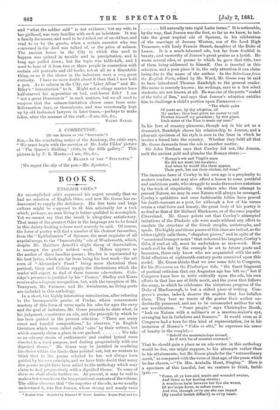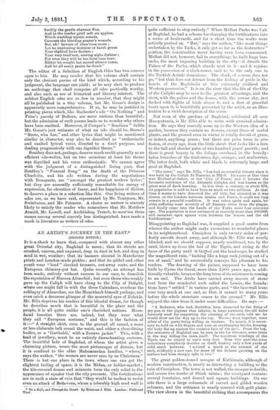BOOKS.
ENGLISH ODES.*
AN accomplished critic expressed his regret recently that we had no selection of English Odes, and now Mr. Gosse has en- deavoured to supply the deficiency. His fine taste and large culture might be slpposed to fit him admirably for a task which, perhaps, no man living is better qualified to accomplish. Yet we cannot say that the result is altogether satisfactory. That many of the greatest Odes in the language are to be found in this dainty-looking volume need scarcely be said. Of course, the lover of poetry will find a number of his choicest favourites, from the " Epithalamion " of Spenser, the most exquisite of all nuptial songs, to the "Immortality" ode of Wordsworth, which, despite Mr. Matthew Arnold's slight shrug of depreciation, is amongst the poet's noblest' work. Milton appears as the author of three familiar poems ; Dryden is represented by his best lyrics, which are far from being his best work—the art even of "Alexander's Feast" being more rhetorical than poetical; Grey and Collins supply the illustrations which the reader will expect to find of these famous cde-writers. Cole- ridge's presence is justified by his " France," Shelley and Keats receive also adequate recognition, but, with the exception of Mr. Tennyson, Mr. Patmore, and Mr. Swinburne, no living poets are included in this anthology.
In a short, but highly interesting introduction, after referring to the incomparable genius of Pindar, whose consummate mastery of this form of verse made his odes for ages the envy and the goal of imitators, Mr. Gosse proceeds to state what, in his judgment, constitutes an ode, and the principle by which he has been guided in the present selection. " There are many sweet and tuneful compositions," he observes, "in English literature which were called called odes' by their writers, but
which scarcely claim a place in our garland We take as an ode any strain of enthusiastic and exalted lyrical verse directed to a fixed purpose, and dealing progressively with one dignified theme." Mr. Gosse may be justified in confining his choice within the limits thus pointed out, but we venture to think that in the poems selected he has not always been guided by his own principle, and we have little doubt that many fine poems might have been added to the anthology which may claim to deal progressively with a dignified theme. To some of these we shall allude further on. At present, it may be well to make a few remarks on the less prominent contents of the volume. The editor observes that "the importer of the ode, as we usually understand it, was Ben Jonson, whose strong and manly verse
English Oka. Selected by Edmund W. Gosse. London; Megan Paul and Co.
fell naturally into rigid Latin forms." It is noticeable, by the way, that Jonson was the first, so far as we know, to imi- tate the great nuptial ode of Spenser, in his celebration of the marriage of Jerome Weston, son of the Lord High Treasurer, with Lady Francis Stuart, daughter of the Duke or Lenox. It is a much-laboured ode, but far from fruitful in beauty, and unworthy of Jonson's great genius as a lyrist. Re- wrote several odes, or poems to which he gave that title, two. of them being addressed to himself. One is inserted in this selection, and a poor piece it is, the only attention it can claim
being due to the name of the author. In the Selections front the English Poets, edited by Mr. Ward, Mr. Gosse may be said
to have introduced Thomas Randolph to the general reader. His name is scarcely known ; his writings, save to a few select students, are not known at all. He was one of the poets "sealed of the tribe of Ben," and says that Jonson's adoption entitles-
him to challenge a child's portion upon Parnassus :- " The whole quire
Of poets are, by thy adoption, all My uncles; thou haat given me power to call Phoebus himself my grandsire ; by this grant, Each sister of the Nine is made my aunt."
In his love of country pleasures, though not in his art as a•
dramatist, Randolph shows his relationship to Jonson, and a pleasant specimen of his style is seen in the lines in which he- invites a friend into the country. Whether they fulfil all that Mr. Gosse demands from the ode is another matter.
Sir John Denham says that Cowley did not, like Jonson,. melt the ancient gold and plunder the Roman stores :—
" Horace's wit and Virgil's state He did not steal, but emulate; And when he would like them appear, Their garb, but not their clothes, did wear."
The immense fame of Cowley in his own age is a perplexity to. modern readers, and may also afford a lesson to some youthful and ambitious poets, who struggle to make themselves notorious by the trick of singularity. On writers who thus attempt to- pervert Nature, we may be sure Nature will always be revenged. Cowley's quiddities and once fashionable follies have proved his death-warrant as a poet, for although a few of his verses retain a vital force and beauty, the great body of his poetry is as dead as that of Sir Richard Blackmore, or of the once popular Cleaveland. Mr. Gosse points out that Cowley's attempted imitations of the Pindaric ode were made without any effort to emulate the structure of the Greek strophe, antistrophe, and epode. His highly ambitious poems of this class are indeed, as the editor rightly calls them, " shapeless pieces," and in spite of the
" occasional trumpet-notes" that redeemed his languor, Cowley's Odes, if read at all, must be undertaken as task-work. How much evil he did by the example he set to future poets and
laureates, those only know who are acquainted with the arti- ficial effusions of eighteenth-century poets conceived upon this model. Mr. Gosse thinks that we owe some debt to Congreve,
for his Discourse on the Pindarigue Ode, "the finest fragment of poetical criticism that our Augustan age has left us ;" but if Congreve knew how to write critically upon the ode, his own-
efforts in that line are of little merit, and the poem that follows the essay, in which he celebrates the victorious progress of the Duke of Marlborough, is but a stilted piece of writing. Con- greve's poems, indeed, deserve the neglect that has befallen them. They bear no traces of the genius their author un- doubtedly possessed, and are to be commended neither for wit nor versification. " Some people," says Christopher North, "look on Nature with a milliner's or a mantua-maker's eye,
arranging her in furbelows and flounces." It would seem as if Congreve had a turn for this kind of representation, for in his imitation of Horace's " Vides sit alta," he expresses his sense
of beauty in the couplet,—
" Behold the mountain-tops around, As if with fur of ermines crowned."
That he should gain a place as an ode-writer in this anthology would be due, one might suppose, to his attempts rather than to his attainments; but Mr. Gosse pleads for the " extraordinary merit," as compared with the verse of that age, of the poem which he has chosen,—" On Mrs. Arabella Hunt, Singing." Here is a specimen of this fanciful, but we venture to think, feeble
lyric :— "Come, all ye love-sick maids and wounded swains,
And listen to her healing strains ; A wondrous balm between her lips she wears, Of sov'reign force, to soften cares; And this, through ev'ry ear she can impart (By tuneful breath diffas'd) to ev'ry heart. Swiftly the gentle charmer flies, And to the tender grief soft air applies, Which warbling mystic sounds, Cements the bleeding panter's wounds. But, ah! beware of elam'rons moan ; Let no unpleasing murmur or harsh groan Your slighted loves declare ; Your very tend'rest, moving sighs forbear ; For even they will be too boiet'rous here. Hither let nought but sacred silence come, And let all saucy praise be dumb."
The editor of a Selection of English Odes has two courses open to him. He may resolve that his volume shall contain only the choicest poems of the kind which, according to his judgment, the language can yield ; or he may elect to produce an anthology that shall comprise all odes poetically worthy, and also such as are of historical and literary interest. The noblest English odes are so few in number, that they might all be.published in a tiny volume, but Mr. Gosse's design is apparently more comprehensive. If so, he may be justified in printing pieces which, like Rochester's ode " On Nothing " and Prior's parody of Boileau, are more curious than beautiful; but the admission of such poems leads us to wonder why others have been omitted. Moreover, if Cowper's " Boadicea" fulfils Mr. Gosse's just estimate of what an ode should be, Burns's Scots, wha hae," and other lyrics that might be mentioned similar in character, may also be described as " enthusiastic and exalted lyrical verse, directed to a fixed purpose, and dealing progressively with one dignified theme."
Southey does not, perhaps, deserve much credit generally as an -efficient ode-writer, but on two occasions at least his theme was dignified and his verse enthusiastic. We cannot agree with -the judgment of a distinguished living poet, that Southey's "Funeral Song" on the death of the Princess Charlotte, and his ode written during the negotiations with Bonaparte, are " amongst the greatest modern lyrics," but they are assuredly sufficiently remarkable for energy of -expression, for elevation of fancy, and for happiness of diction, to deserve a place in a selection like this. Our living writers of odes are, as we have said, represented by Mr. Tennyson, Mr. Swinburne, and Mr. Patmore. A choice so narrow is scarcely likely to satisfy the reader who remembers that Mr. Matthew Arnold, Mr. Lowell, and Archbishop Trench, to mention three names among several scarcely less distinguished, have made a mark in literature as writers of odes.



































 Previous page
Previous page